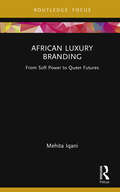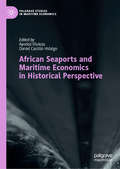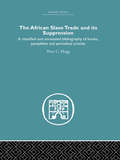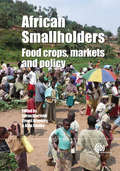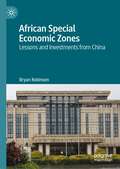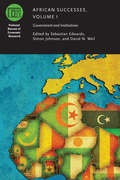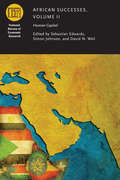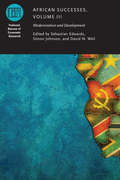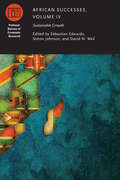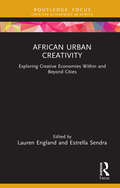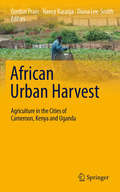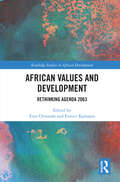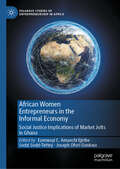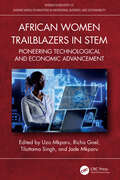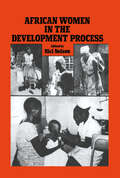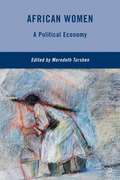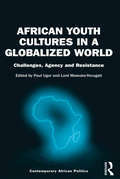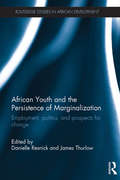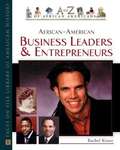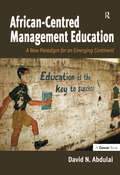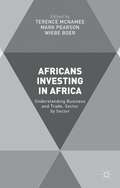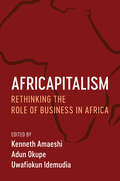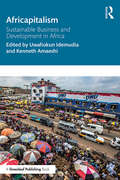- Table View
- List View
African Luxury Branding: From Soft Power to Queer Futures (Routledge Critical Advertising Studies)
by Mehita IqaniBringing together critical race, queer and decolonial analytical approaches, visual analysis, and multimodal discourse analysis, this book explores the discursive strategies deployed by African luxury brands in an age of cross-platform, intertextual branding. Building on literature examining the aesthetics and politics of African luxury, this book demonstrates how leading African luxury brands create visual material speaking to complex sensibilities of culture, nature, and future. Iqani shows how powerful brand narratives and strategies reveal ethical and ideological messages that function to re-position Africa in an increasingly congested global marketplace of ideas. In acknowledging that there is a strong political validity to recognizing the importance of African brands staking their claim in luxury, this book also problematizes the role these brands play in the promotion of luxury discourses, advancing the project of capitalism and their contribution to broader patterns of inequality. Shedding new light not only on luxury branding strategies but also on the idea of a luxurious global “Africanicity” and on the complex cultural politics of South Africa, African Luxury Branding will be of interest to advanced students and researchers in disciplines, including Critical Advertising Studies, African Studies, Media and Communications.
African Migrants and the Refugee Crisis
by Olayiwola Abegunrin Sabella O. AbiddeThis book discusses African migration and the refugee crisis. Economic, political and social tension in the Middle East and in many parts of the Global South has induced historic mass migration across national and international borders. The situation is especially dire in Africa, where a sizable number of Africans have chosen or have been forced to leave their countries of origin for Europe and North America. Written by an international team of scholars, this edited book traces the refugee crisis around the world, telling the necessary story of forced migration, intentional exclusion, and human insecurity from an Afrocentric lens. The volume is divided into three sections. Section I places African migration within the broader contexts of international history, law, economics, and policy. Section II discusses cases of African migration to Europe, Latin America, and the Mediterranean. Section III considers negative consequences of mass African migration, including the restriction and criminalization of migration, post-traumatic stress disorder, and gender-based violence. A compelling account of risk, resilience, and global power dynamics, this volume will be useful to students and researchers interested in African studies, migration, peace and conflict studies, and policy as well as professionals, practitioners, NGOs, IGOs, governmental and humanitarian organizations.
African Perspectives on Trade and the WTO
by Patrick Low Chiedu Osakwe Maika OshikawaTwenty-first century Africa is in a process of economic transformation, but challenges remain in areas such as structural reform, governance, commodity pricing and geopolitics. This book looks into key questions facing the continent, such as how Africa can achieve deeper integration into the rules-based multilateral trading system and the global economy. It provides a range of perspectives on the future of the multilateral trading system and Africa's participation in global trade and underlines the supportive roles that can be played by multilateral and regional institutions during such a rapid and uncertain transition. This volume is based on contributions to the Fourth China Round Table on WTO Accessions and the Multilateral Trading System, which took place just before the World Trade Organization's Tenth Ministerial Conference in Nairobi in December 2015.
African Seaports and Maritime Economics in Historical Perspective (Palgrave Studies in Maritime Economics)
by Ayodeji Olukoju Daniel Castillo HidalgoThis book updates African maritime economic history to analyse the influence of seaports and seaborne trade, processes of urbanization and development, and the impact of globalization on port evolution within the different regions of Africa. It succeeds the seminal collection edited by Hoyle & Hilling which was conceived during a phase of sustained economic growth on the African continent, and builds on a similar trend where African economies have experienced processes of economic growth and the relative improvement of welfare conditions. It provides valuable insights on port evolution and the way the maritime sector has impacted the hinterland and the regional economic structures of the affected countries, including the several and varied agents involved in these activities. African Seaports and Maritime Economics in Historical Perspective will be useful for economists, historians, and geographers interested in African and maritime issues, as well as policy makers interested in path-dependence and long-term analysis
African Slave Trade and Its Suppression: A Classified and Annotated Bibliography of Books, Pamphlets and Periodical Articles
by Peter C. HoggFirst Published in 2005. Routledge is an imprint of Taylor & Francis, an informa company.
African Smallholders: Food Crops, Markets and Policy
by Göran Djurfeldt Ernest Aryeetey Aida IsinikaBased on highly topical international research in a high-priority area, this book documents the farm-level effects of the reorientation of agricultural policies with different themes for the different countries such as micro-credit, infrastructure, cash crop production and food security. It discusses staple food production in sub-Saharan Africa and its response to changing geo-political, macro-economic and agricultural policy, to deepen our understanding of how agricultural development unfolds at farm level. It is a useful resource for all those researching or involved with food security, agricultural development and African food planning.
African Special Economic Zones: Lessons and Investments from China
by Bryan RobinsonThis book evaluates African Special Economic Zones from the perspective of learning from China’s experiences with such Zones and the impact of Chinese policy and investment on African Zones. Utilising case studies of perceived successful Special Economic Zones in China, the book proposes the Chinese Model of Special Economic Zones as an evaluation and benchmarking tool against which African Special Economic Zones are considered. Applying several case studies on African Special Economic Zones, the book then details the competitiveness of African Special Economic Zones with a specific focus on attracting Chinese investors to these Zones. The economic, social and environmental impact of these zones are appraised. African Nations’ efforts, or lack thereof, to enable successful Special Economic Zones are critically analysed. Finally, Special Economic Zones in Africa are compared against the Chinese Model; and an African Model of Special Economic Zones is proposed. Recommendations are presented to both African Nations’ leadership and Chinese policymakers and investors as to how these Zones can be improved to enhance competitiveness and the attainment of the Zones’ sustainable development objectives.
African Successes, Volume I: Government and Institutions
by Simon Johnson Sebastian Edwards David N. WeilStudies of African economic development frequently focus on the daunting challenges the continent faces. From recurrent crises to ethnic conflicts and long-standing corruption, a raft of deep-rooted problems has led many to regard the continent as facing many hurdles to raise living standards. Yet Africa has made considerable progress in the past decade, with a GDP growth rate exceeding five percent in some regions. The African Successes series looks at recent improvements in living standards and other measures of development in many African countries with an eye toward identifying what shaped them and the extent to which lessons learned are transferable and can guide policy in other nations and at the international level. The first volume in the series, African Successes: Governments and Institutions considers the role governments and institutions have played in recent developments and identifies the factors that enable economists to predict the way institutions will function.
African Successes, Volume II: Human Capital
by Simon Johnson Sebastian Edwards David N. WeilStudies of African economic development frequently focus on the daunting challenges the continent faces. From recurrent crises to ethnic conflicts and long-standing corruption, a raft of deep-rooted problems has led many to regard the continent as facing many hurdles to raise living standards. Yet Africa has made considerable progress in the past decade, with a GDP growth rate exceeding five percent in some regions. The African Successes series looks at recent improvements in living standards and other measures of development in many African countries with an eye toward identifying what shaped them and the extent to which lessons learned are transferable and can guide policy in other nations and at the international level. The second volume in the series, African Successes: Human Capital turns the focus toward Africa's human capital deficit, measured in terms of health and schooling. It offers a close look at the continent's biggest challenges, including tropical disease and the spread of HIV.
African Successes, Volume III: Modernization and Development
by Simon Johnson Sebastian Edwards David N. WeilStudies of African economic development frequently focus on the daunting challenges the continent faces. From recurrent crises to ethnic conflicts and long-standing corruption, a raft of deep-rooted problems has led many to regard the continent as facing many hurdles to raise living standards. Yet Africa has made considerable progress in the past decade, with a GDP growth rate exceeding five percent in some regions. The African Successes series looks at recent improvements in living standards and other measures of development in many African countries with an eye toward identifying what shaped them and the extent to which lessons learned are transferable and can guide policy in other nations and at the international level. The third volume in the series, African Successes: Modernization and Development looks at the rise in private production in spite of difficult institutional and physical environments. The volume emphasizes the ways that technologies, including mobile phones, have made growth in some areas especially dynamic.
African Successes, Volume IV: Sustainable Growth
by Simon Johnson Sebastian Edwards David N. WeilStudies of African economic development frequently focus on the daunting challenges the continent faces. From recurrent crises to ethnic conflicts and long-standing corruption, a raft of deep-rooted problems has led many to regard the continent as facing many hurdles to raise living standards. Yet Africa has made considerable progress in the past decade, with a GDP growth rate exceeding five percent in some regions. The African Successes series looks at recent improvements in living standards and other measures of development in many African countries with an eye toward identifying what shaped them and the extent to which lessons learned are transferable and can guide policy in other nations and at the international level. The fourth volume in the series, African Successes: Sustainable Growth combines informative case studies with careful empirical analysis to consider the prospects for future African growth.
African Urban Creativity: Exploring Creative Economies Within and Beyond Cities (Creative Economies in Africa)
by Lauren England Estrella SendraThe edited collection, African Urban Creativity: Exploring Creative Economies Within and Beyond the Cities, seeks to contribute to understanding creative economies in Africa, specifically the urban dynamics of creativity and the urbanisation of the creative economy. In doing so, it also acknowledges the role of the periphery and rural settings within their inputs and dialogic relation to the city.The book contains six original contributions from academic researchers and creative practitioners, bringing together a range of disciplinary perspectives and presenting case studies from across the continent (Ghana, Kenya, Nigeria, Senegal and South Africa). The book is structured in two parts. Part 1 explores different dynamics of urban culture, identities and local development opportunities. Part 2 focuses on the complex dialogue between cities and their peripheries or rural settings. The editors’ conclusions reflect key themes of leadership, social and cultural development and urban-rural connectivity, and present implications of policy and practice.This text provides readers with empirical insights from Africa that can lead to more research, debate and policy engagement on the sustainable development of creative economies in Africa. This edited collection launches the new book series Routledge Focus on Creative Economies in Africa.
African Urban Harvest: Agriculture in the Cities of Cameroon, Kenya and Uganda
by Gordon Prain Nancy Karanja Diana Lee-SmithOver the past two decades, how has urban agriculture changed in sub-Saharan Africa? Is city farming now better integrated into environmental management and city governance? And, looking ahead, how might urban agriculture address the needs of the low-income households and modernizing cities of Africa? In this book, leading specialists in the fields of urban agriculture and urban environment present a unique collection of case studies that examines the growing role of local food production in urban livelihoods in sub-Saharan Africa. Amongst many issues, the authors probe the changing role of urban agriculture, the risks and benefits of crop-livestock systems, and the opportunities for making locally produced food more easily available and more profitable. Concluding chapters reflect on the policy and governance implications of greater integration of urban natural resources and the built environment, an expanded role for urban agriculture in sub-Saharan Africa and the crucial role of women in urban food systems. African Urban Harvest will be of interest to decision-makers, development professionals, researchers, academics, and students and educators in urban planning, development studies, African studies, and environmental studies.
African Values and Development: Rethinking Agenda 2063 (Routledge Studies in African Development)
by Ezra Chitando Eunice KamaaraThis book considers the importance of African values, not only in catalysing development, but in sustaining it. Arguing for an urgent need for rapprochement between African politicians and intellectuals, the book discusses how African values and identities can contribute to the successful realization of initiatives such as the African Union’s Agenda 2063 and the United Nation’s Sustainable Development Goals (SDGs). Over the course of the book, the authors consider key themes such as identity, indigenous and modern worldviews; personhood; individual and communal perspectives; peace and conflict; and well-being. The book explores the role of religion and moral values, as well as African worldviews such as Ubuntu. Overall, the book demonstrates that African values will be central to galvanising Africa’s post-colonial transformation. This book will be an important read for policymakers and for researchers working on African development, politics, sociology, religion and philosophy.
African Women Entrepreneurs in the Informal Economy: Social Justice Implications of Market Jolts in Ghana (Palgrave Studies of Entrepreneurship in Africa)
by Ezenwayi C. Amaechi Ejiribe Sodzi Sodzi-Tettey Joseph Ofori-DankwaThis book analyzes the significant obstacles facing women traders in marketplaces in Ghana and proposes policy recommendations that would enhance economic development. The editors first characterize these challenges as jolts and develop a comprehensive typology of jolts that the market women face. They then provide a detailed analysis of the social justice implications associated with the jolts. Next, subject area experts thoroughly depict the different types of jolts that market women face and highlight current policies and strategies used by national and local government authorities to deal with these jolts. Finally, the editors highlight recommended policies and strategies that can be used to successfully address the effects of the various jolts encountered by market women. Women traders operating in the Ghanaian marketplace unquestionably play a significant role in the development of the national economy. This book, therefore, aims to raise awareness of these jolts, identify several recommendations to mitigate them, and, by so doing, help address social injustices and aid in national development.
African Women Trailblazers in STEM: Pioneering Technological and Economic Advancement (Women in Industry 4.0)
by Uzo Mkparu, Richa Goel, Tilottama Singh, and Jade MkparuDespite recent advancements, gender disparities in STEM disciplines remain a major concern worldwide, particularly in Africa. This book focuses on empowering women in STEM to highlight the barriers they face in accessing and excelling in these areas, as well as proposing concrete solutions to bridge this gap. Africa possesses a vast pool of untapped STEM talent, especially among women and this book aims to support women in entering and thriving in STEM careers by providing opportunities and support, leading to a more diverse and dynamic workforce.African Women Trailblazers in STEM: Pioneering Technological and Economic Advancement offers firsthand accounts of successful women in STEM fields across Africa, providing access to valuable data on economic innovation in the region. It sheds light on the challenges African women face in STEM and offers strategies to overcome them, showcasing the achievements of women in STEM and their contributions to the field. The book also explores the correlation between women in STEM in Africa and the Sustainable Development Goals, presenting case studies and data on the gender gap in STEM fields. Acknowledging the unique challenges women of diverse backgrounds face, including race, ethnicity, social status, and location, this book provides readers with a deeper understanding of the importance of inclusive empowerment strategies and how intersecting identities impact women's experiences in STEM fields.This book can educate stakeholders and policymakers on the importance of funding programs that promote gender equality and women's participation in STEM fields. By offering evidence-based recommendations, the book can influence policy decisions aimed at creating more inclusive and supportive environments for women in STEM education and professions.
African Women in the Development Process
by Nici NelsonFirst published in 1981. The World Conference in Mexico City in 1975 marked the beginning of a global examination of women's roles in the economic, political and social life of their societies and a recognition of their right to participate fully and equally in all aspects of society. Most of the articles in this volume confirm, a great deal more needs to be done. Women continue to be more underfed, under educated and overworked than men ... a neglected and under-utilized minority. All of the articles in this Special Issue concentrate on sub-Saharan Africa, with the exception of Beneria's paper 'Accounting for Women's Work' which is a genera theoretical article. Most of the articles (five out of eight) in this issue deal with specific situations in which African women find themselves, ranging widely from sub-elite nurses in Zambia to the efforts of uneducated women in Nigeria to form a cooperative. Two of these articles concern the effect of development projects on women.
African Women: A Political Economy
by Meredeth TurshenThis book will present three main themes of African women: African feminism, women and work, and women and politics, to inform readers of the current debates, to encourage new thinking on these issues, and to indicate areas for needed research.
African Youth Cultures in a Globalized World: Challenges, Agency and Resistance (Contemporary African Politics)
by Lord Mawuko-Yevugah Paul UgorAll over the world, there is growing concern about the ramifications of globalization, late-modernity and general global social and economic restructuring on the lives and futures of young people. Bringing together a wide body of research to reflect on youth responses to social change in Africa, this volume shows that while young people in the region face extraordinary social challenges in their everyday lives, they also continue to devise unique ways to reinvent their difficult circumstances and prosper in the midst of seismic global and local social changes. Contributors from Africa and around the world cover a wide range of topics on African youth cultures, exploring the lives of young people not necessarily as victims, but as active social players in the face of a shifting, late-modernist civilization. With empirical cases and varied theoretical approaches, the book offers a timely scholarly contribution to debates around globalization and its implications and impacts for Africa's youth.
African Youth and the Persistence of Marginalization: Employment, politics, and prospects for change (Routledge Studies in African Development)
by Danielle Resnick James ThurlowThe much heralded growth and transformation of many economies in sub-Saharan Africa over the last decade continues to receive prominent attention in academic scholarship and among policy practitioners. An apparent feature about this transformation, however, is that Africa’s youth appear to have been left out. This book critically examines the extent and consequences of the marginalization of African youth. It questions conventional wisdoms about data trends, aspirational goals, and common policy interventions surrounding Africa’s youth that have been variously propagated in both the development studies literature and in mainstream donor policy reports. The book explores macro trends from both a temporal and cross-regional perspective in order to highlight what is distinct about contemporary African youth and whether their prospects and behaviours do actually vary from their counterparts in other regions of the world or from previous generations of African youth. Such studies include cross-country analyses of youth employment patterns and modes of political participation, in-depth examination of the behaviours and aspirations of the urban youth, and critical reflections on the impact of rural employment initiatives, vocational education, and learnership programmes. The incorporation of multiple methods and disciplines, as well as its attention to policy issues, ensures that the book will be of great interest to graduate students, researchers, and professional researchers whose work lies at the intersection of African area studies and development studies as well as those focused on development economics, political science, and public policy and administration.
African-American Business Leaders and Entrepreneurs
by Rachel KranzTo fill a gap in US history, an author/documentary film producer specializing in racial issues profiles a broad spectrum of African-American business leaders from the colonial period to the present. Entries are listed by type of business and individual's year of birth. Among the figures featured on the cover are Maggie L. Walker (1867-1934), the first US woman bank president, and Omar Wasow, who created a black-oriented Web site. Annotation ©2004 Book News, Inc., Portland, OR (booknews.com)
African-Centred Management Education: A New Paradigm for an Emerging Continent
by David N. AbdulaiIn African-Centred Management Education, Professor Abdulai looks critically at the failings of management education in Africa and how that has impacted growth and development efforts, especially at this critical stage in the continent’s positive growth and development trajectory. He concludes that Africa’s current positive economic growth cannot be sustained without a significant contribution from its human capital. He adds that, the outstanding economic record of Asian economies in recent decades dramatically illustrates how important human capital is to growth. These countries lacking natural resources and importing practically all their energy requirements have grown rapidly by relying on a well-trained, educated and conscientious workforce. Professor Abdulai believes that Africa, too, can sustain its current growth and development by effectively combining its abundant natural resources with its human capital to attain its economic development, but this will require an African cadre of well-trained managers at the helm of both private and public sector institutions. For this to become a reality, management education in Africa will have to play a significant role, but the author argues that it cannot be effective by continually mimicking the West in the programmes it delivers. It must come up with innovative and relevant pedagogy that will address the special challenges that the continent faces and deliver an African-centred management education. As well as pointing to the failures of management education in Africa, Abdulai offers suggestions as to how to make management education really contribute to the education of Africans, in order to sustain current and future development.
Africans Investing in Africa
by Mark Pearson Terence Mcnamee Wiebe BoerAfricans Investing in Africa explores intra-African trade and investment by showing how, where and why Africans invest across Africa; to identify the economic, political and social experiences that hinder or stimulate investment; and to highlight examples of pan-African investors. This book is the outcome of a project conceived in 2011 by the Johannesburg-based Brenthurst Foundation and the Lago-based Tony Elumelu Foundation. The foundations, drawing on their established record of scholarship and policy advice on issues impacting Africa's economic growth and development, agreed to undertake in-depth, case-study based research into why African-owned or/and African-based companies were still struggling to succeed across multiple geographies on the continent, despite the Africa's impressive economic growth rates and overall improvements in macro-economic management.
Africapitalism: Rethinking The Role Of Business In Africa
by Kenneth Amaeshi Adun Okupe Uwafiokun IdemudiaAfrica is on the rise. Enabled by natural resources, commodity trading and the recent discovery of Africa as the last frontier of capitalism by the global market, African entrepreneurs are now being empowered as economic change agents. How can this new economic elite engage in the sustainable development of the continent? 'Africapitalism', the term coined by Nigerian economist Tony O. Elumelu, describes an economic philosophy embodying the private sector's commitment to the economic transformation of Africa through investments generating economic prosperity and social wealth. The concept has attracted significant attention in both business and policy circles. Promoting a positive change in approach and outlook towards development in Africa, this book consolidates research and insights into the Africapitalism movement, and will appeal to scholars, researchers and graduate students of Africa studies, international business, business and society, corporate social responsibility, strategic management, economic thought, international political economy, leadership and development studies.
Africapitalism: Sustainable Business and Development in Africa
by Kenneth Amaeshi Uwafiokun IdemudiaUsing theory, empirical research, and case studies, this book explores the changing nature of business in Africa and how businesses can actively contribute to the development of Africa. It uses (and critically analyses) the concept of Africapitalism – a management philosophy and movement which seeks to blend the best of African values and Western management theories as a basis for sustainable development in Africa – to understand the subtle factors that underpin business decisions in Africa. The collection of chapters in this book are organized around actors, issues, and reflections. They collectively present an account of Africapitalism, albeit from different perspectives and on different issues, and open up a new space for rethinking business and society relations in Africa from an Africapitalism perspective. Crucial is the critical engagement with both the discourse and practice of Africapitalism and its implications for sustainable development. It is anticipated that the challenges and opportunities highlighted by the book would be embraced by researchers, policy makers, and practitioners in the broad area of business and society in Africa. This multidisciplinary book will be valuable reading for advanced students, researchers and policymakers looking at business in society; corporate social responsibility; sustainable business; international business and African development.
